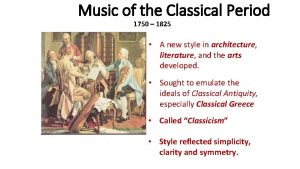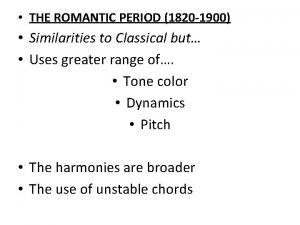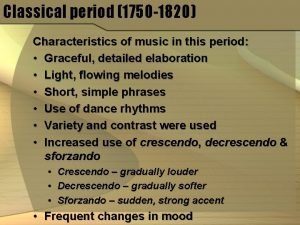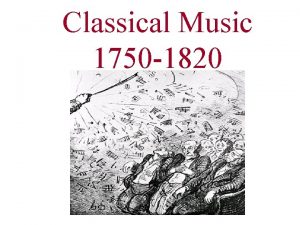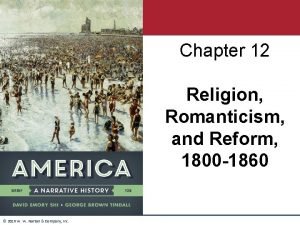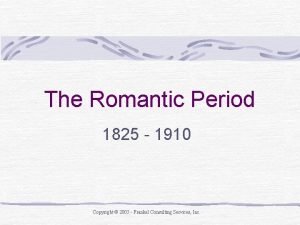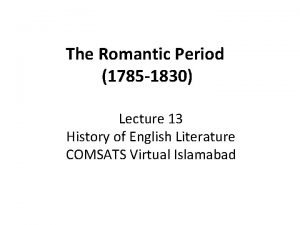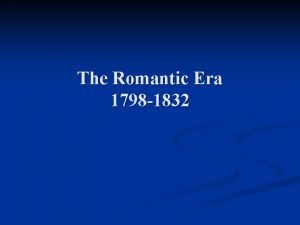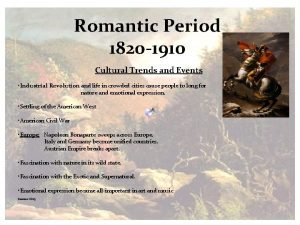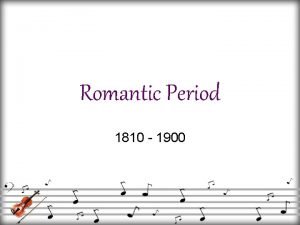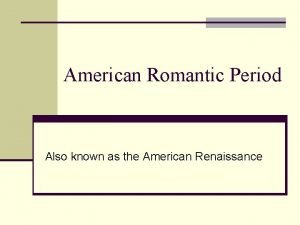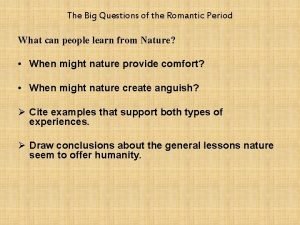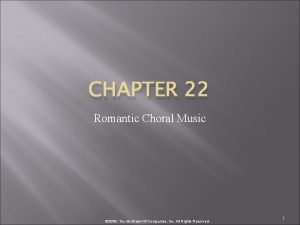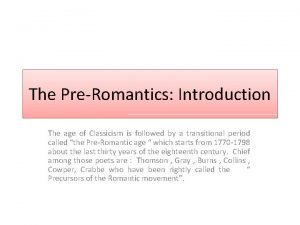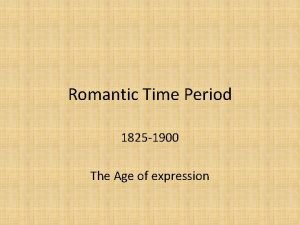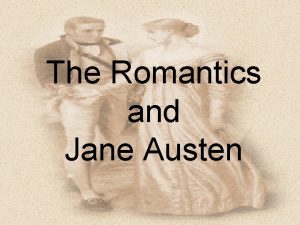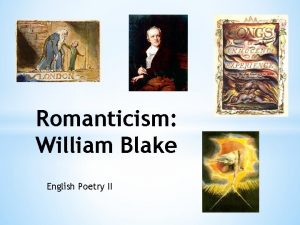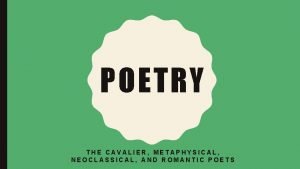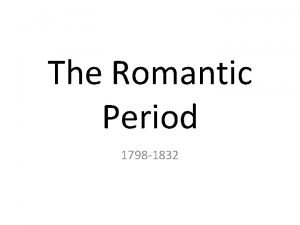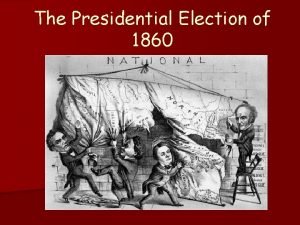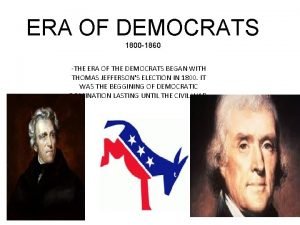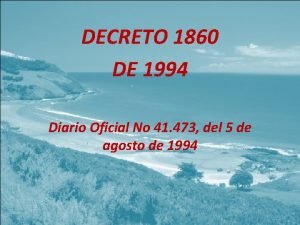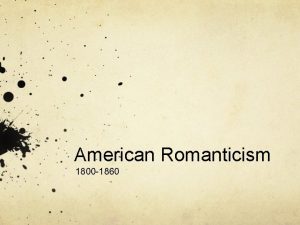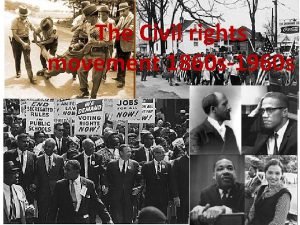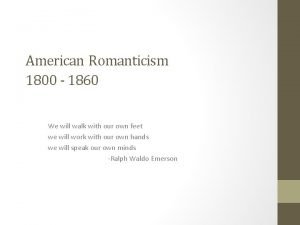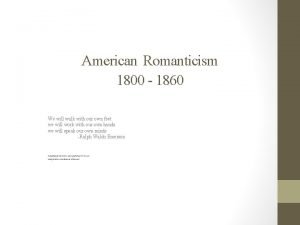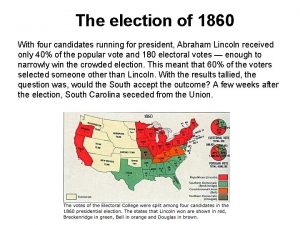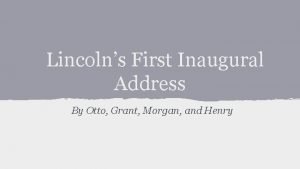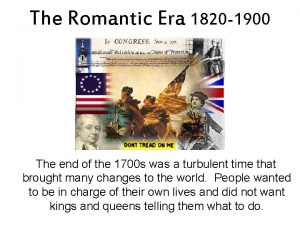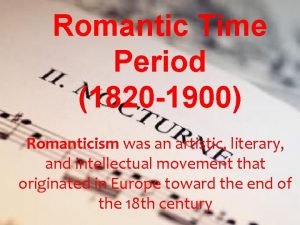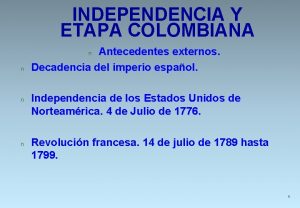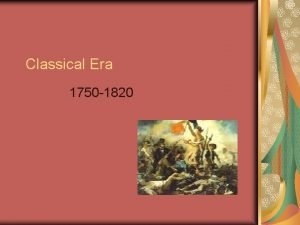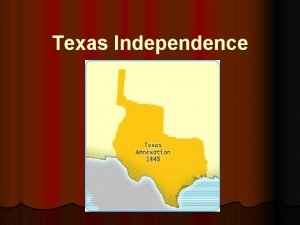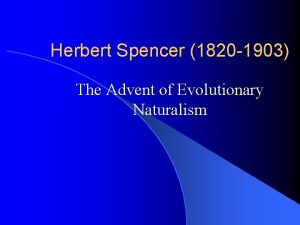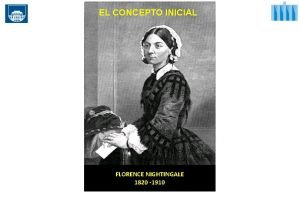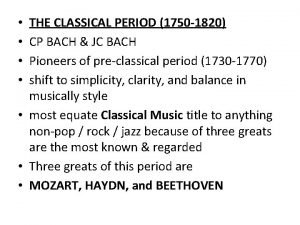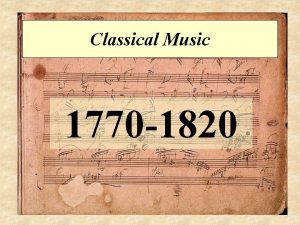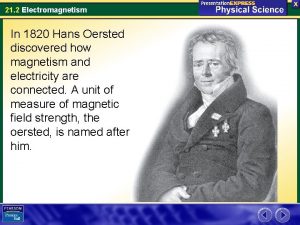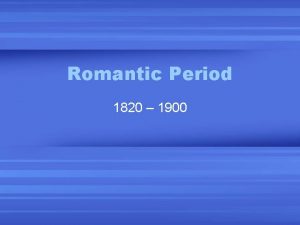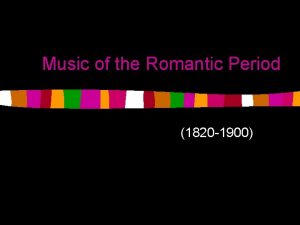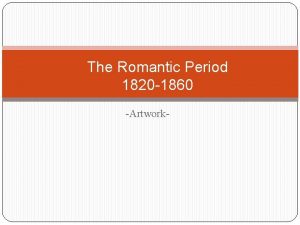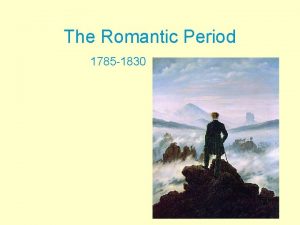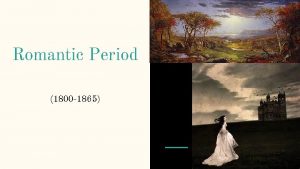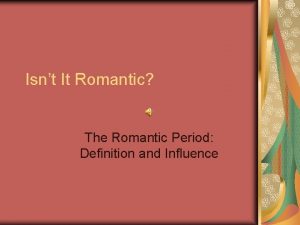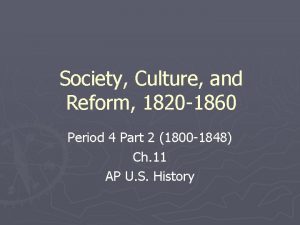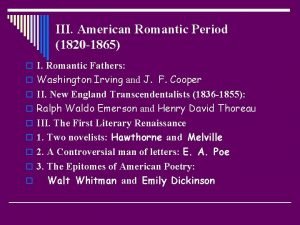The Romantic Period 1820 1860 And 19 th
















































































- Slides: 80

The Romantic Period (1820 -1860) And 19 th Century Regionalism

Romanticism in America coincided with the period of national expansion and the discovery of a distinctive American voice. • The solidification of a national identity, and • the surging idealism and passion of • Romanticism inspired the masterpieces • of "the American Renaissance. "

Romantic ideas centered around art as inspiration, the spiritual and aesthetic dimension of nature, and metaphors of organic growth. • Art, rather than science, • Romantics argued, • could best express universal truth. • The Romantics underscored • the importance of expressive art • for the individual and society.

The self awareness and development became major themes. According to Romantic theory if, self and nature were one, selfawareness was not a selfish dead end but rather a mode of knowledge opening up the universe. • If one's self were one with all humanity, • then the individual had a moral duty to reform social inequalities and relieve • human suffering.

• New compound words with positive meanings emerged: • "self-realization, " • "self-expression, " • "self- reliance. "

Henry Clay Lewis, 1825 -1850 (c 1858)

These humorous sketches are entertaining; although often they can be offensive because of the stereotypes of minority characters (e. g. Native Americans or African Americans) and presenting disabilities (e. g. dwarfism) as butts for humor. • Lewis might have made a name for himself had he lived longer: • The story of his death— • the 25 -year-old doctor drowning in the bayou while on the way home from a house call— • sounds like an • incident from one of his own sketches!






Artistic effects and techniques were developed to evoke heightened psychological states. • The "sublime" -- an effect of beauty in grandeur (for example, a view from a mountaintop) -produced feelings of awe, reverence, vastness, and power. • America's vast mountains, deserts, and tropics embodied the sublime.

• The Romantic spirit seemed particularly suited to American democracy— • --It stressed individualism, affirmed the value of the common person, • and looked to the inspired imagination for its values.


Mojave Desert

• The New England Transcendentalists -Ralph Waldo Emerson, Henry David Thoreau, and their associates— • In • New England, • were inspired to a new optimistic affirmation by the Romantic movement. • Romanticism especially thrived.

The Transcendentalist movement was a manifestation of the general humanitarian trend of 19 th century thought. • • The movement was based on a fundamental belief in the unity of the world and God. The soul of each individual was thought to be identical with the world— The doctrine of self- reliance and individualism developed through the belief in the identification of the individual soul with God. • Concord, Mass. was a • rural artist's colony and • the first place to offer a spiritual • and cultural alternative to • American materialism. • It was a place of highminded • conversation and simple living.

Concord Pond, Mass.


Walden Pond, Mass.



• • The Transcendental Club was loosely organized in 1836 and included • • Emerson, Thoreau, • Brownson (a leading minister), Parker (abolitionist and minister), • • • and Hawthorne.

Brook Farm, Mass.

Walt Whitman (1819 -1892)

Leaves of Grass • 21 – “Liberty Poem for Asia, Africa, Europe, America, Australia, Cuba, • and The Archipelogoes of the Sea” • COURAGE! my brother or my sister! Keep on! • Liberty is to be subserved, what ever occurs; • That is nothing, that is quelled by one or two fail ures, or any number of failures, • • Or by the indifference or ingratitude of the people, Or the show of the tushes of power -- soldiers, cannon, penal statutes.

• What we believe in waits latent forever through Asia, Africa, Europe, America, Australia, Cuba, and all the islands and archipelagoes of the sea; • What we believe in invites no one, promises nothing, sits in calmness and light, is positive and composed, knows no discouragement, • Waits patiently its time -- a year -- a century -- a hundred centuries.



• The battle rages with many a loud alarm and frequent advance and retreat, • The infidel triumphs – • or supposes he triumphs, The prison, • scaffold, garrote, hand-cuffs, iron neck lace and anklet, lead-balls, do their work, • The named and unnamed heroes pass to other spheres, • The great speakers and writers are exiled -- they lie sick in distant lands,

• The cause is asleep -- the • The young men drop their eye -lashes toward the strong throats are ground when they meet, choked with their own But for all this, blood, • liberty has not gone out of the • • place, nor the infidel entered into possession.

• • • When liberty goes out of a place, it is not the first to go, nor the second or third to go, It waits for all the rest to go -- it is the last. When there are no more memories of the lovers of the whole of the nations of the world, The lovers' names scouted in the public gatherings by the lips of the orators, Boys not christened after them, but christened after traitors and murderers instead, Laws for slaves sweet to the taste of people – • the slave-hunt acknowledged,

• You or I walking abroad upon the earth, • elated at the sight of slaves, no matter who they are, And when all life and all the souls of men and women are discharged from any part of the earth,

“Iraqi-Freedom-Liberty”

Then shall the instinct of liberty be discharged from that part of the earth, Then shall the infidel and the tyrant come into possession.

LIBERTY

Let Freedom Ring!


The Transcendentalists published a quarterly magazine, _The Dial_. It discussed many social and spiritual issues. A number of Transcendentalists were abolitionists, and some were involved in experimental utopian communities such as nearby Brook Farm. American Transcendental Romantics pushed radical individualism to the extreme. American writers often saw themselves as lonely explorers outside society and convention.


More information • http: //www. ti. org/aboutti. shtml

• The American hero–like • Herman Melville’s Captain Ahab, or • Mark Twain’s Huck Finn, • typically face risk, • or even certain destruction, • in the pursuit of • metaphysical self-discovery.


http: //www. georgetown. edu/faculty/bassr/218/projects/lawrence. htm http: //stpauls-oxnard. com/sogg/book 9/page 9_34. htm


Huck Finn






• Edgar Allan Poe, a southerner, shares with Melville • a darkly metaphysical vision mixed with elements • of realism. • Many of his stories prefigure the genres of science fiction, • horror, and fantasy so popular today.

Poe's verse, like that of many Southerners, was very musical and strictly metrical. His best-known poem, in his own lifetime and today, is "The Raven" (1845). • • In this eerie poem, the haunted, sleepless narrator, who has been reading and mourning the death of his "lost Lenore" at midnight, is visited by a raven (a bird that eats dead flesh, hence a symbol of death) who perches above his door and ominously repeats the poem's famous refrain, "nevermore. " The poem ends in a frozen scene of death-in-life: • • “And the Raven, never flitting, still is sitting On the pallid bust of Pallas just above my chamber door; And his eyes have all the seeming of a demon's that is dreaming, And the lamp-light o'er him streaming throws his shadow on the floor; And my soul from out that shadow that lies floating on the floor Shall be lifted--Nevermore!”

Joel Chandler Harris 1845 - 1908 • A native of Eatonton, GA, • Joel Chandler Harris gained fame as the writer of children's stories • told in dialect by • Uncle Remus, a slave who entertained a young white boy with American folktales.

• • Born to the unwed Mary Harris, he suffered the pangs of illegitimacy by stammering in public and being self-effacing. Obviously bright, Harris received the attention of Andrew Reid who paid his tuition at Union Academy. • He befriended elderly slaves George Terrell and Old Harbert • who entertained him with trickster tales about Brer Rabbit • and Brer Fox and • the other critters in the Briar Patch.

• In 1862 Harris left Eatonton to work as a printer's aid on • The Countryman published by Joseph Addison Turner • on his Putnam County plantation, Turnworld. • There he studied the trade of the journalist under Turner's watchful eye…

… and from a fence post at Turnwold witnessed • Sherman's March to the Sea, • an event he captured in his tribute to Turner, • the 1892 memoir, • On the Pantation.

http: //www. gsu. edu/~wwwelf/elfjch. html • • • Harris left Putnam County for newspaper jobs in New Orleans and Savannah before landing at the Atlanta Constitution in 1879. The next year appeared the collection Uncle Remus, His Songs and Sayings and in 1883, Nights with Uncle Remus. • • The animated exposure of Walt Disney's 1946 "Song of the South" has obscured the true Uncle Remus tales that are more complex than presented in the movie • • and represent only part of Harris' work. •


• • Unlike the moonlight and magnolias of the popular southern fiction of his day, Harris wove complicated stories filled with humor and pathos. • • In Mingo, and Other Sketches in Black and White, published in 1884, Free Joe, published in 1887, and Daddy Jake the Runaway, published in 1889, • • • Harris presented a darker side to slavery than had previously appeared in the Uncle Remus tales.

• • • These stories epitomized the tragedy and realism of the age. Like his contemporary and friend, Mark Twain, Harris composed a national literature that used localism to describe the universal. This shy red-headed and freckled man understood more of humanity and the world because of personal circumstances which enables him to relate to those society deemed less fortunate. He died at his Atlanta home, the Wren's Nest.

More info • • http: //www. gsu. edu/~dsihhj/harris. htm http: //guweb 2. gonzaga. edu/faculty/campbell/enl 311/harris. htm http: //www. southerncurrents. com/misc/tarbaby 3. htm http: //www. mupress. org/webpages/books/brasch. html • http: //xroads. virginia. edu/~UG 97/remus/bio. html • http: //xroads. virginia. edu/~UG 97/remus/contents. html









Okeefenokee Swamp

Okeefenokee Swamp

The Wren’s Nest, Atlanta


The next generation of American writers-- • --particularly Southerners, • used regionalism to convey less comical, • more dark tones, • reflecting reality • often as a means for social-commentary. William Faulkner 1897 -1962




Mississippi River
 1750s music
1750s music American reform movements between 1820 and 1860
American reform movements between 1820 and 1860 Characteristics of the romantic period
Characteristics of the romantic period Apush 1820 to 1860
Apush 1820 to 1860 Music of the classical period (1750 to 1820)
Music of the classical period (1750 to 1820) Music of classical period 1750 to 1820
Music of classical period 1750 to 1820 Period of activism (1970-1972)
Period of activism (1970-1972) The romantic period in american literature and art
The romantic period in american literature and art Site:slidetodoc.com
Site:slidetodoc.com W.w. norton
W.w. norton Wagner romantic era
Wagner romantic era Characteristic of romantic period
Characteristic of romantic period Romantic age timeline
Romantic age timeline 5 i's of romanticism
5 i's of romanticism The romantic period 1798 to 1832
The romantic period 1798 to 1832 Romantic period
Romantic period The romantic period 1798 to 1832 summary
The romantic period 1798 to 1832 summary Characteristic of romantic art
Characteristic of romantic art Vocal music of the romantic period
Vocal music of the romantic period Romantic principles
Romantic principles Romantic era poetry characteristics
Romantic era poetry characteristics Romantic era events
Romantic era events Romantic archestra
Romantic archestra The nutcracker
The nutcracker American romantic period
American romantic period Questions about romanticism literature
Questions about romanticism literature Romantic period choral music
Romantic period choral music Romantic period in british literature
Romantic period in british literature What is romanticism
What is romanticism Pre romantic age
Pre romantic age Romantic vs classical music
Romantic vs classical music Romanticism dates
Romanticism dates Age of romanticism in english literature
Age of romanticism in english literature Jane austen romantic period
Jane austen romantic period The romantic period in american literature
The romantic period in american literature Elements of romanticism
Elements of romanticism Characteristics of the romantic period
Characteristics of the romantic period Romantic age starts from
Romantic age starts from Romantic philosophy
Romantic philosophy Characteristic of romantic period
Characteristic of romantic period Romantic period characteristics
Romantic period characteristics Romantic period theater
Romantic period theater Characteristics of the romantic period
Characteristics of the romantic period Define metaphysical poetry
Define metaphysical poetry The romantic age (1798 to 1824)
The romantic age (1798 to 1824) 1798 in english literature
1798 in english literature Border states in 1860
Border states in 1860 Puffing billy aspirateur
Puffing billy aspirateur The election of 1860 definition
The election of 1860 definition Whig party beliefs
Whig party beliefs Decreto 1860 de 1994
Decreto 1860 de 1994 American romanticism 1800 to 1860 worksheet answers
American romanticism 1800 to 1860 worksheet answers South carolina 1860
South carolina 1860 1860
1860 American romanticism 1800 to 1860 worksheet answers
American romanticism 1800 to 1860 worksheet answers American romanticism 1800 to 1860 worksheet answers
American romanticism 1800 to 1860 worksheet answers Map of 1860
Map of 1860 John breckinridge opinion on slavery
John breckinridge opinion on slavery South africa 1860
South africa 1860 1820 hairstyles
1820 hairstyles It is an era from 1750-1820
It is an era from 1750-1820 Revolucion liberal de 1820
Revolucion liberal de 1820 1820-1900
1820-1900 Juan jose flores
Juan jose flores Revolucion liberal de 1820
Revolucion liberal de 1820 1820-1750
1820-1750 It is a habitual and firm disposition to do good
It is a habitual and firm disposition to do good Moses austin
Moses austin La traviata juomalaulu
La traviata juomalaulu Militarisml
Militarisml La campaña definitiva 1820 a 1822
La campaña definitiva 1820 a 1822 Nihilismo terapeutico
Nihilismo terapeutico Bach classical period
Bach classical period Simon bolivar y antonio jose de sucre
Simon bolivar y antonio jose de sucre Florence nightingale was born in 1820 to a rich family
Florence nightingale was born in 1820 to a rich family 1770s music
1770s music 1820-1750
1820-1750 Hans holmgren fysiker
Hans holmgren fysiker Absolute refractory period and relative refractory period
Absolute refractory period and relative refractory period Absolute refractory period and relative refractory period
Absolute refractory period and relative refractory period Trustee period and royal period
Trustee period and royal period
